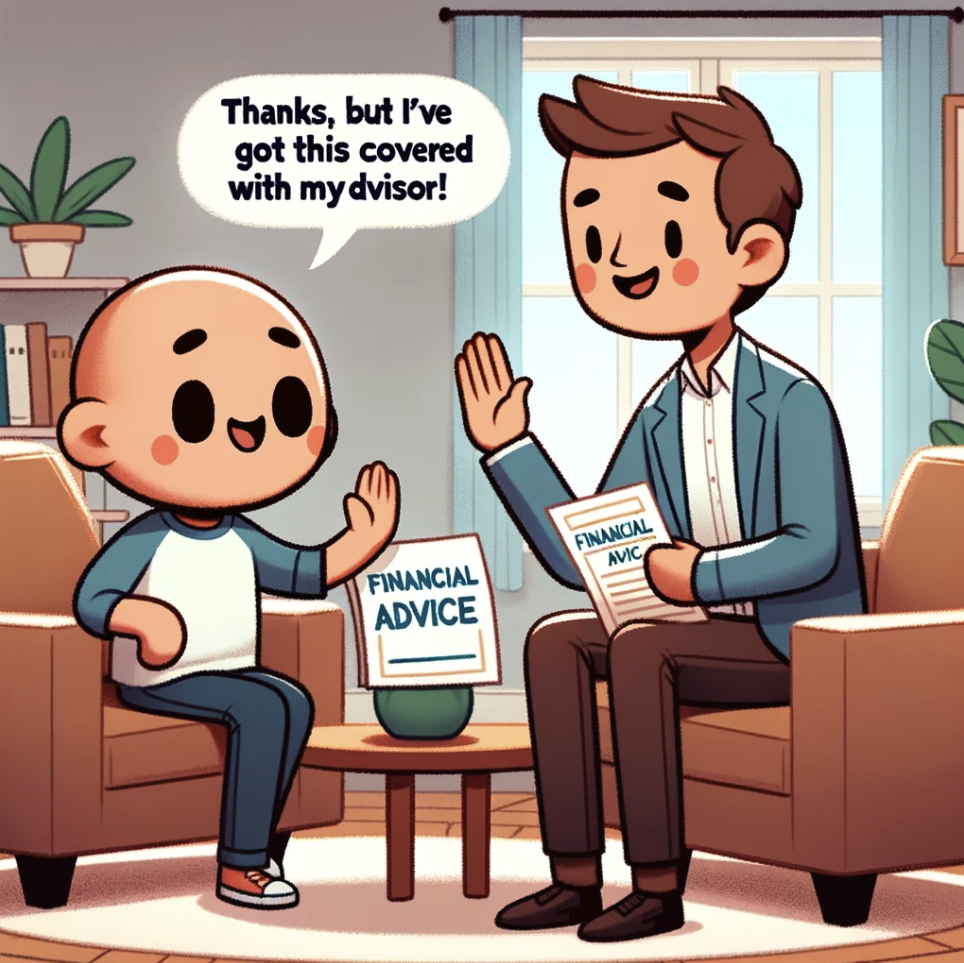Navigating personal finance can often lead us to seek advice from the most accessible sources: our family and friends.
While their insights are usually offered with the best intentions, acting on such advice without proper consideration can lead to less-than-ideal outcomes.
It’s essential to strike a balance between valuing these relationships and making informed financial decisions that align with our unique situations.
However, there comes a time when we must respectfully decline financial advice from those close to us.
Doing so in a manner that preserves the relationship while affirming our autonomy is a delicate art. Below are ten examples of how to gracefully decline financial advice from family and friends.
These responses are crafted to express gratitude for their concern, acknowledge the value of their input, and gently assert our preference to follow a personalized financial plan, often developed with the guidance of a professional financial advisor.
Respectful Ways to Decline Financial Advice
When Offered Stock Market Tips
“I really appreciate you sharing your stock picks with me. I’m currently following a specific investment strategy with my advisor, but I’ll definitely keep your suggestions in mind. Thanks for thinking of me!”
Regarding Buying or Selling Property
“Thank you for your input on the property market. It’s a big decision, and I’m consulting with a real estate advisor to see what’s best for me right now.”
On Taking Out Loans
“Thanks for suggesting that loan option. I’m looking into a few different financial paths and consulting with a professional to decide what’s most sustainable for my financial health.”
When Advised to Cut Expenses Drastically
“I appreciate your advice on managing my expenses. I’m working with a budgeting consultant to create a plan that balances saving and living comfortably. It’s good to have your support.”
Upon Receiving Retirement Planning Suggestions
“Your thoughts on retirement planning are really interesting. I’ve got a session booked with a financial planner to map out my retirement in detail, but I’ll keep your ideas in mind as I make decisions. Thanks for caring!”
If Recommended to Invest in Cryptocurrency
“Cryptocurrency is such an intriguing area. I’m currently following a diversified investment strategy and will need to do more research before venturing into crypto. But I appreciate you bringing it up!”
When Encouraged to Join a Friend’s Business Venture
“Starting a business together sounds exciting, and I’m flattered you thought of me. Right now, I’m focusing on a few personal financial goals, but let’s keep the conversation going. Who knows what the future holds?”
If Advised to Switch Banks for Better Benefits
“Switching banks is a big move, and I see why you recommend it. I plan to discuss all my banking needs with a financial advisor to see what’s best. Thanks for pointing this out to me!”
Upon Being Advised to Save Money by DIY Investing
“DIY investing is definitely an option I’ve considered. I’ve decided to learn more about it while working with an advisor to ensure I’m making informed decisions.”
When Suggested to Use a Specific Budgeting App
“That app sounds great, and I’m glad it’s working for you. I’ve got a system in place that I’m adjusting with the help of a financial coach, but I’ll look into the app to see if it fits into my plan. Thanks for sharing!”
When You See Someone Else Taking Dubious Financial Advice
- “It’s great that you’re seeking advice to make informed financial decisions. Have you considered double-checking this information with a certified financial advisor? It’s always good to get a second opinion, especially on important financial matters.”
- “I understand that navigating financial decisions can be challenging. While it’s tempting to take advice from those around us, it’s crucial to ensure the information is accurate and comes from a knowledgeable source. Maybe exploring articles from reputable financial news sources or consulting a professional could offer more reliable guidance.”
- “I’ve noticed some of the financial advice you’ve been getting seems a bit off. Financial planning is complex and getting it wrong can have big consequences. How about we look into this together and maybe find some well-established financial guidance online or from a professional?”
- “It’s admirable that you’re actively seeking advice on your finances. However, some of the information you’ve been given might not be accurate. Financial strategies can vary greatly between individuals, so what works for one person might not work for another. Maybe a certified professional could offer advice tailored to your specific situation.”
- “Seeing you take steps to manage your finances better is fantastic. Just be cautious with the advice you follow, especially if it’s not from someone with a financial background. Misinformation can sometimes lead to costly mistakes. Things that seem plausibly true may not be and things that may be superficially accurate have a lot more nuance to them and factors and variables to consider. There are plenty of reputable financial advisors and resources out there that could provide you with reliable and personalized advice.”
- “I’ve heard some of the financial tips you’ve been given, and I worry they might not be in your best interest. Finance can be quite intricate, and well-intentioned advice can sometimes lead us astray if it’s not based on solid expertise. Let’s find a time to sit down with a financial planner who can help sort out what’s best for you.”
- “It’s crucial to critically evaluate financial advice, especially when it comes from sources that may not be fully informed about the complexities of financial planning. Investing a bit of time and perhaps money into consulting with a certified financial planner could save you a lot in the long run.”
Conclusion
These examples demonstrate how to maintain respect and gratitude while asserting your own approach to managing your finances.


